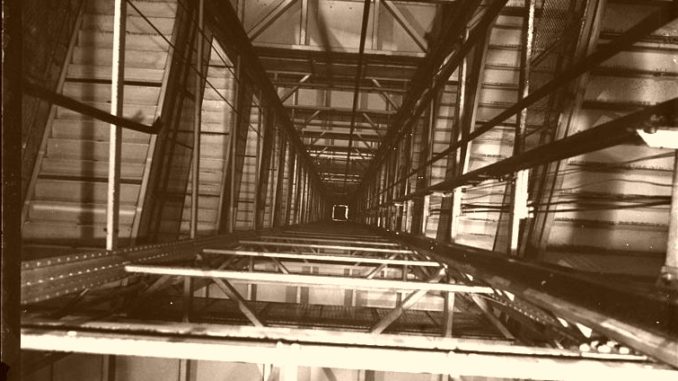
Several times over these past few days, I’ve again had to endure the annoying experience of listening to “music” while on hold. Whether it’s a company’s technical support line, customer service, sales, or just my dentist’s office, every business provides generic, ostensibly “soothing”, and completely forgettable background music to hapless victims on hold. While I am now of the age that I’ll more likely choose mellow and soothing music over, say, heavy metal, I find this distorted milquetoast bilge… grating. So, while being tortured on hold, I began to wonder how it all started, what brought us to this acoustic madness, and whom to blame. But first, let’s briefly cover a bit of historic background to provide gratuitous context.
Major General George Owen Squier [pronounced ‘square’] (1865-1934), West Point graduate, career Army officer, and Ph.D. graduate of Johns Hopkins University, served as Chief Signal Officer of the U.S. Signal Corps during the First World War. Among his many other accomplishments, he was directly responsible for the 1907 formation of the Aeronautical Division of the U.S. Signal Corps, the great grandaddy of the U.S. Air Force. In addition to being an early expert in aviation, he was also an expert on electricity and radio, writing a number of books and articles on these subjects.
Squier was also an inventor of several technologies, including telephone carrier multiplexing, which earned him a place in the National Academy of Science. In the early 1920s, Squier was granted several patents for technology he invented to transmit ‘information signals’, such as radio broadcasts, over wires. The wires could be electric lines, telephone lines, or telegraph lines, and the ‘information signals’ would be transmitted in addition to, and simultaneously with, the primary purpose of the wires (i.e., electricity, telephone, or telegraph signals). In those early days of broadcasting, radio reception wasn’t always reliable, but Squier’s method was.
Wired Radio, Inc., was established in 1922 to provide homeowners with dependable radio broadcasts, even from radio stations that were too far away or too weak to easily recieve. This is the initial iteration of ‘piped-in’ music, and was probably the first example of a subscription cable service. As radio improved however, homeowners no longer had a need or desire to pay for ‘cable’ radio when they could get radio over the air for free. The company had to adjust, and so took aim at commercial customers to replace the evaporating home market. As part of the marketing redirection, Squier invented and trademarked the name ‘Muzak’ in 1934. It’s said that he was inspired by the invented marketing name ‘Kodak’, from which he borrowed the ‘-ak’ and prefixed it with ‘Muse’, or music, thus creating the ‘Muzak’ brand that would play in the background in offices and factories across the country for decades.
Muzak enjoyed popularity from the 1930s through the 1960s, at which time it started facing competition from “foreground music” and disdain from baby boomers who had come of age. By sometime in the ’70s, it was all over for piped-in background music. Though it went through some hard times and a bankruptcy, Muzak evolved and still exists today, but the background music derisively known as ‘elevator music’ and ‘Muzak’ is long gone.
What? Elevator music is gone? What then is that noise which assaults us in the land of on-hold? That, my friends, is the sound of competition. Several other companies have gotten into the game, but here’s a revelation: it’s not their fault the on-hold music sounds scratchy, crackly, static-y, distorted, warped, and in short, just plain offensive to the ears.
Modern telephone technology is optimized for voice calls, not full-frequency-range music. Both individual telephones (especially cellphones!) and the telephone system itself actively try to cut out background noise in order for conversation to be easily heard and understood. So higher and lower frequencies are cut out, or clipped, and not transmitted.
For on-hold music to have any hope and chance to sound good – or at least not quite so awful – several ducks need to find themselves in a row. First, each business which puts customers on hold must care about what their customers are exposed to and tortured with while on hold. Second, the on-hold hardware and software employed by the business must be designed with the frequency limitations of the telephone system in mind. (Most businesses purchased systems that are all wrong for telephony). It does absolutely no good to employ hardware and software that faithfully reproduces high-quality recordings that would make any audiophile proud. Also, little details matter, like not letting the summer intern set the output volume too high. Third, the music produced specifically for on-hold systems needs to avoid notes that produce frequencies that are too high (generally above 4,000Hz) or too low (sorry, couldn’t find a lower limit published anywhere, but I’m sure it’s out there, somewhere). In summary, on-hold music producers and musicians need to avoid the high treble and low bass sounds.
To be fair, I take back what I said in the first paragraph about on-hold music being “completely forgettable” and “milquetoast bilge”. I was venting, and those were uncalled for insults. Some of those tunes are quite catchy, and I’m sure I would enjoy them while on hold if they could be heard without distortion. Well, at least I’d try.
Here’s an example of on-hold music done well – from a telephone company!
“Best Hold Music Waiting on the Phone” (2:06):
And now for the masochists, an example of horrid on-hold “music”. Be glad it’s short.
“E-ZPass has the worst on-hold music I’ve ever heard” (0:39):
Question of the Night: What’s the worst on-hold experience you’ve ever had?
